Ecuador’s presidential runoff on April 13 features incumbent Daniel Noboa against Luisa González. Both candidates received about 44 percent of the first-round votes, with Leonidas Iza’s 5 percent pivotal for potential voter support. The Division in the National Assembly complicates governance for the winner, amid pressing national issues like security and employment.
In the Ecuadorian presidential runoff scheduled for April 13, voters will choose between the incumbent Daniel Noboa and former Assemblywoman Luisa González. This election follows a first-round vote where both candidates secured approximately 44 percent of the total votes, with Noboa winning a narrow margin of 19,800 votes against 13.8 million voters. Third-place candidate Leonidas Iza garnered 5 percent and has expressed refusal to endorse either candidate, emphasizing that his supporters will not back what he perceives as a right-wing candidate.
The upcoming election is set against a backdrop of a divided National Assembly. The recent legislative elections revealed that González’s Citizen Revolution party secured 67 seats while Noboa’s National Democratic Action party obtained 66. Neither candidate achieved a majority in the expanded 151-seat Assembly, necessitating alliances with smaller political parties, including Iza’s Pachakutik, which holds 9 seats. This environment poses significant challenges for either candidate in advancing their legislative initiatives.
Comparatively, President Noboa faces numerous challenges related to security, employment, and energy supply, reminiscent of his previous tenure. His approach has been likened to that of President Bukele from El Salvador, raising questions about its effectiveness. Analysis of both candidates’ platforms by AS/COA online highlights critical voter issues that will influence the upcoming election, particularly in light of the slow yet steady growth projected for the region in 2025.
The Ecuadorian presidential runoff presents a pivotal choice for voters between the continuation of Daniel Noboa’s presidency and a return to Luisa González’s alternative agenda. With the backdrop of a split National Assembly and pressing issues surrounding security and the economy, both candidates face significant challenges. The key to victory may well lie in their ability to attract voters from third-party candidates and navigate legislative complexities effectively.
Original Source: www.as-coa.org






